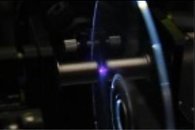- Joined
- Oct 9, 2007
- Messages
- 47,802 (7.40/day)
- Location
- Dublin, Ireland
| System Name | RBMK-1000 |
|---|---|
| Processor | AMD Ryzen 7 5700G |
| Motherboard | Gigabyte B550 AORUS Elite V2 |
| Cooling | DeepCool Gammax L240 V2 |
| Memory | 2x 16GB DDR4-3200 |
| Video Card(s) | Galax RTX 4070 Ti EX |
| Storage | Samsung 990 1TB |
| Display(s) | BenQ 1440p 60 Hz 27-inch |
| Case | Corsair Carbide 100R |
| Audio Device(s) | ASUS SupremeFX S1220A |
| Power Supply | Cooler Master MWE Gold 650W |
| Mouse | ASUS ROG Strix Impact |
| Keyboard | Gamdias Hermes E2 |
| Software | Windows 11 Pro |
GE Global Research, the technology development arm of the General Electric Company, today announced a major breakthrough in the development of next generation optical storage technology. GE researchers have successfully demonstrated a threshold micro-holographic storage material that can support 500 gigabytes of storage capacity in a standard DVD-size disc. This is equal to the capacity of 20 single-layer Blu-ray discs, 100 DVDs or the hard drive for a large desktop computer.
GE's micro-holographic discs will be able to be read and recorded on systems very similar to a typical Blu-ray or DVD player. Holographic storage is different from today's optical storage formats like DVDs and Blu-ray discs. DVDs and Blu-ray discs store information only on the surface of the disc; holographic storage technology uses the entire volume of the disc material. Holograms, or three-dimensional patterns that represent bits of information, are written into the disc and can then be read out. Although GE's holographic storage technology represents a breakthrough in capacity, the hardware and formats are so similar to current optical storage technology that the micro-holographic players will enable consumers to play back their CDs, DVDs and BDs.


The GE team successfully recorded micro-holographic marks approaching one percent reflectivity with a diameter of approximately one micron. When using standard DVD or Blu-ray disc optics, the scaled down marks will have sufficient reflectivity to enable over 500 GB of total capacity in a CD-size disc.
"GE's breakthrough is a huge step toward bringing our next generation holographic storage technology to the everyday consumer," said Brian Lawrence, who leads GE's Holographic Storage program. "Because GE's micro-holographic discs could essentially be read and played using similar optics to those found in standard Blu-ray players, our technology will pave the way for cost-effective, robust and reliable holographic drives that could be in every home. The day when you can store your entire high definition movie collection on one disc and support high resolution formats like 3-D television is closer than you think."
GE has been working on holographic storage technology for over six years. The demonstration of materials that can support 500 gigabytes of capacity represents a major milestone in making micro-holographic discs that ultimately can store more than one terabyte, or 1,000 gigabytes of data. In addition to pushing the limits of storage capacity, GE researchers also have been very focused on making the technology easily adaptable to existing optical storage formats and manufacturing techniques.
"GE's holographic storage program has turned the corner, and with this milestone we can now intensify our efforts in commercialization opportunities," said Bill Kernick, who leads GE's Technology Ventures team. "We'll continue to engage with a variety of strategic partners to create the best route from product development to introduction into the marketplace."
GE initially will be focusing on the commercial archival industry followed by the consumer market for its micro-holographic storage technology.
View at TechPowerUp Main Site
GE's micro-holographic discs will be able to be read and recorded on systems very similar to a typical Blu-ray or DVD player. Holographic storage is different from today's optical storage formats like DVDs and Blu-ray discs. DVDs and Blu-ray discs store information only on the surface of the disc; holographic storage technology uses the entire volume of the disc material. Holograms, or three-dimensional patterns that represent bits of information, are written into the disc and can then be read out. Although GE's holographic storage technology represents a breakthrough in capacity, the hardware and formats are so similar to current optical storage technology that the micro-holographic players will enable consumers to play back their CDs, DVDs and BDs.


The GE team successfully recorded micro-holographic marks approaching one percent reflectivity with a diameter of approximately one micron. When using standard DVD or Blu-ray disc optics, the scaled down marks will have sufficient reflectivity to enable over 500 GB of total capacity in a CD-size disc.
"GE's breakthrough is a huge step toward bringing our next generation holographic storage technology to the everyday consumer," said Brian Lawrence, who leads GE's Holographic Storage program. "Because GE's micro-holographic discs could essentially be read and played using similar optics to those found in standard Blu-ray players, our technology will pave the way for cost-effective, robust and reliable holographic drives that could be in every home. The day when you can store your entire high definition movie collection on one disc and support high resolution formats like 3-D television is closer than you think."
GE has been working on holographic storage technology for over six years. The demonstration of materials that can support 500 gigabytes of capacity represents a major milestone in making micro-holographic discs that ultimately can store more than one terabyte, or 1,000 gigabytes of data. In addition to pushing the limits of storage capacity, GE researchers also have been very focused on making the technology easily adaptable to existing optical storage formats and manufacturing techniques.
"GE's holographic storage program has turned the corner, and with this milestone we can now intensify our efforts in commercialization opportunities," said Bill Kernick, who leads GE's Technology Ventures team. "We'll continue to engage with a variety of strategic partners to create the best route from product development to introduction into the marketplace."
GE initially will be focusing on the commercial archival industry followed by the consumer market for its micro-holographic storage technology.
View at TechPowerUp Main Site
Last edited:







 or SSD which ever comes first.
or SSD which ever comes first.